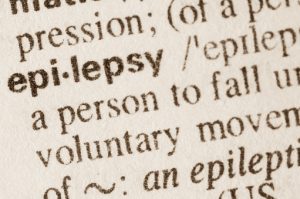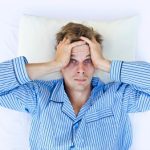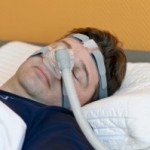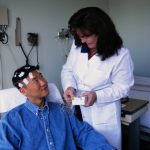 The medical community has long known that people who suffer from epilepsy experience sudden electrical activity in the brain, and now there is significant evidence suggesting that sleep – particularly sleep deprivation – can trigger epileptic seizures.
The medical community has long known that people who suffer from epilepsy experience sudden electrical activity in the brain, and now there is significant evidence suggesting that sleep – particularly sleep deprivation – can trigger epileptic seizures.
A lack of sleep is associated with a number of negative health effects, including a suppressed appetite, loss of concentration and chronic diseases. Now, due to modern technologies, such as video electroencephalogram (EEG) and polysomnography (PSG), epilepsy observations have been made even clearer.
Advertisement
Over the last few years, new studies, and analysis of data collected in the 1960s and 1970s, have helped the medical community develop a better picture of the relationship between sleep and epilepsy.
Although we can’t say for certain why, research shows that sleep deprivation can increase the intensity and length of sleep seizures. Some forms of epilepsy appear to be especially prone to sleep problems.
Link between sleep deprivation and epileptic seizures
 According to the Department of Neurology at Vanderbilt University Medical Center in Nashville, Tennessee, one study showed that sleep deprivation is a cause of idiopathic generalized epilepsy in 28 percent of epileptic patients. During the same study, sleep seizures, known as temporal lobe epilepsy, were also observed in 27 percent of patients. A strong relation was found between sleep deprivation and the temporal lobe seizures in patients who kept daily diaries, which included details about the duration and date they experienced sleep seizures.
According to the Department of Neurology at Vanderbilt University Medical Center in Nashville, Tennessee, one study showed that sleep deprivation is a cause of idiopathic generalized epilepsy in 28 percent of epileptic patients. During the same study, sleep seizures, known as temporal lobe epilepsy, were also observed in 27 percent of patients. A strong relation was found between sleep deprivation and the temporal lobe seizures in patients who kept daily diaries, which included details about the duration and date they experienced sleep seizures.
The information analyzed by Vanderbilt indicated that patients with partial epilepsy, who were free of daily stress, did not seem to experience frequent seizures during sleep or when sleep was disrupted. Those with sleep disorders, such as sleep apnea, had a higher risk of worse seizures or more frequent epileptic seizures.
Obstructive sleep apnea is an intermittent pause in breathing. A French physician brought it to the world’s attention back in 1965. Since then, the interface between epilepsy and sleep disorders has received more attention. Today, sleep deprivation is often looked at during EEG when a waking EEG fails to show any abnormality.
In one recent study, patients from an outpatient neurological clinic who had possible seizures and suspected sleep disorders were evaluated with EEG and PSG. The patient seizure statistics, sleep disorders, and the response to therapies were reviewed and the interface explored. Fifty patients underwent PSG and half were diagnosed with epilepsy, with almost three-quarters having sleep disorders that required therapy.
Neurologists say that sleep activates the electrical charges in our brain that can result in seizures. What we have learned over many decades is that seizures are timed according to the sleep/wake cycle. For some people, the seizures only occur at night during sleep. This happens especially in the case of benign focal epilepsy, which is a childhood form of epileptic seizures.
Epilepsy and sleep disorders are a vicious cycle. Epilepsy itself disrupts sleep and sleep deprivation aggravates epilepsy. Sometimes the drugs used to treat epilepsy can also aggravate sleep. Since lack of sleep can be a trigger for seizures, getting a good sleep each night is very important if you have epilepsy.
Studies show that people who suffer from epilepsy have a higher rate of sleep apnea. Research conducted by the University of Michigan demonstrated that one-third of epileptic patients suffer from sleep apnea. Additionally, the data from Michigan suggested that epilepsy patients who have sleep apnea are more likely to have seizures at night when they are trying to rest.
What provokes epileptic seizures?
While we may not be able to say for certain why, for some reason, the following appear to provoke sleep seizures:
 Lack of quality sleep: This means you aren’t feeling rested when you wake up and have no energy during the day.
Lack of quality sleep: This means you aren’t feeling rested when you wake up and have no energy during the day.
- Difficulty falling asleep: Moods, awake-seizures and medications can cause insomnia.
- Anxiety: Depression and anxiety make it hard to fall asleep or stay asleep.
- Bad eating habits: Eating and/or drinking late at night.
- Medication side effects: Some medications can make it easy to fall asleep, but others make it hard to drift off.
- Sleep disorders: Sleep problems, such as sleep apnea or restless leg syndrome prevent quality sleep from occurring.
During sleep there is a lot happening in our brains. Our brainwaves switch from wakefulness to drowsiness and from light sleep to deep sleep to Rapid Eye Movement (REM) sleep. This cycle takes place three to four times per night. Dramatic changes can be seen on an EEG during the sleep cycle. Although the mechanism is not fully understood, there is evidence that this activity influences seizures.
Nocturnal seizures, seizures that start during sleep
It is important to note that a lot of people have sleeping problems, but it does not mean that they will ever experience a seizure. Epileptic patients have a high incidence of what is now commonly referred to as epilepsy sleeping problems. This could mean the sleep leads to the seizure or they can’t sleep because they are in fact experiencing a seizure.
Any form of seizure can take place when an epileptic is sleeping, but some types are exclusive to sleep. These are called nocturnal seizures. Studies indicate that anywhere from 10 to 45 percent of people with epilepsy have seizures that only happen during sleep or with sleep deprivation. Nocturnal seizures tend to happen during light sleep; soon after a person falls asleep or just before waking up.
Tips to get good sleep and reduce seizures
Since epilepsy and sleep disorders seem to have a strong association, getting good sleep is key. Applying a few simple tips to your daily routine can help improve your sleep and reduce seizures if you suffer from epilepsy.
 Exercising regularly – especially earlier in the day has helped people who suffer from sleep seizures. Working out just before bed is not a great idea since it can awaken the endorphins and end up keeping you awake instead.
Exercising regularly – especially earlier in the day has helped people who suffer from sleep seizures. Working out just before bed is not a great idea since it can awaken the endorphins and end up keeping you awake instead.- Follow a sleep schedule – keep consistent hours. Go to bed at the same time each night and wake up at the same time. This teaches your body, including your brain, to get used to a certain sleep cycle.
- Create the perfect environment for sleep – make sure your bedroom is comfortable, dark, quiet and free of distractions like electronic devices.
Here are a few other tips to help you sleep:
- Avoid caffeine at least five to six hours before bed.
- Take a warm bath or shower before bed.
- Limit alcohol at night.
- Consider meditation before bed.
If you have tried all the above tips and still can’t fall asleep, it is best to get out of bed and do something that is relaxing for about 30 minutes – until you get tired.
Managing the symptoms of epileptic seizures
 Avoiding triggers can help epilepsy patients control the number of seizures that occur. Sleep deprivation and stress are two common causes for epileptic seizures.
Avoiding triggers can help epilepsy patients control the number of seizures that occur. Sleep deprivation and stress are two common causes for epileptic seizures.
The support of family, friends, classmates and co-workers is important. They need to be aware of the condition and how to help in the event that a seizure takes place. Many people with epilepsy say it gives them “peace of mind” knowing that people around them can jump in if necessary.
Here is what to do if you witness someone having a seizure:
- Lay the person down on his/her side.
- Loosen clothing around the neck.
- Check for a medical ID bracelet.
- Do not put anything in the person’s mouth.
- Monitor the person’s vital signs.
- Stay with the person until medical personnel arrive.
Avoiding triggers and making sure people are aware of the condition are just two issues that epileptics have to think about. People with epilepsy face a number of other challenges, including both cognitive and social problems. The good news is that the disorder can be controlled and patients can lead a full life. At the same time, researchers around the world continue to examine epilepsy and sleep deprivation, in the hopes that eventually epilepsy sleeping problems will be wiped out.
Related Reading:
Sleep apnea, sleep disordered breathing (SBD) and stroke risk
Sleep apnea, sleep disordered breathing (SBD), has been linked to an increased stroke risk. Sleep disordered breathing is a condition characterized by a group of disorders, which involve abnormal respiratory patterns or insufficient ventilation during sleep. Continue reading…
Advertisement
Easy fixes for your common sleep problems
You toss and you turn and, sadly, the next morning you’re more tired than ever. Not getting proper sleep can really put a damper on your daily activities and negatively impact your health. Continue reading…
Sources:
http://www.medscape.com/viewarticle
http://www.ncbi.nlm.nih.gov/pmc/articles
http://www.epilepsy.com/learn/triggers-seizures/lack-sleep-and-epilepsy
http://www.medscape.com/viewarticle
http://www.ncbi.nlm.nih.gov/pubmed
https://sleepfoundation.org/sleep-disorders-problems/disease-and-sleep/epilepsy
https://www.epilepsy.org.au/about-epilepsy/understanding-epilepsy/nocturnal-seizures-during-sleep
